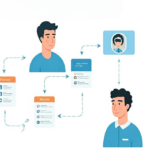
In today’s digital era, the use of multi-cloud systems has become increasingly common. Companies are opting for strategies that allow them to distribute their data and applications across multiple cloud providers to enhance flexibility, performance, and security. However, with this strategy, new challenges also arise, with data privacy being one of the most important. In this blog, we will dive into how companies can ensure the privacy of their data while leveraging the benefits of a multi-cloud environment.
What is a Multi-Cloud System?
A multi-cloud system is a strategy that allows a company to use multiple cloud service providers, such as AWS, Microsoft Azure, or Google Cloud, to host different parts of its technological infrastructure. This approach offers advantages such as reducing dependency on a single provider, improving availability, and the ability to adapt solutions to specific needs. However, managing data privacy across multiple clouds can be challenging, especially when handling sensitive information.
Privacy Challenges in Multi-Cloud Systems
When using a multi-cloud system, companies face the complexity of ensuring that data is protected on each of the clouds involved. Here are some of the main challenges:
1. Regulatory Compliance
Compliance with data privacy regulations, such as GDPR or the California Consumer Privacy Act (CCPA), becomes more complex when data is distributed across different cloud providers. Laws vary from one region to another, and each cloud provider may have different security and privacy policies. Companies must ensure that their data is protected according to local and global laws across all the clouds they use.
2. Inconsistent Encryption
Each cloud provider may offer its own encryption implementation and key management. This can lead to inconsistencies in how data is protected when moving from one cloud to another or between different parts of the infrastructure. If data is not consistently encrypted throughout the system, there is a risk of exposure at some point in the process.
3. Access and Control
When data is distributed across different clouds, it is more difficult to control who has access to it and how permissions are managed. Multi-cloud systems can increase the risk of unauthorized users accessing confidential data if access policies are not well-coordinated among different providers.
Strategies to Ensure Data Privacy in Multi-Cloud Systems
Despite the challenges, there are several strategies that companies can adapt to ensure data privacy in a multi-cloud environment.
1. Implementation of End-to-End Encryption
One of the best ways to ensure data privacy is through the use of end-to-end encryption. This means that data is encrypted before being sent to the cloud and only decrypted when accessed from a secure environment. By implementing this approach, companies ensure that their data remains secure throughout the entire process, regardless of how many clouds they use. Using key management tools such as AWS Key Management Service (KMS) or Google Cloud Key Management is essential for ensuring privacy.
2. Continuous Auditing and Monitoring
Continuous auditing and monitoring are essential to maintain data privacy in multi-cloud environments. Companies should implement monitoring systems that track real-time access to data, as well as transfers between different clouds. By using tools like Splunk or Datadog, organizations can quickly identify any suspicious behavior or unauthorized access, allowing them to respond to potential privacy breaches with greater agility.
3. Unified Access Policies
It is vital to establish unified access policies that apply to all clouds used. This includes implementing a centralized identity and access management (IAM) system to ensure that only authorized users can access sensitive data. Providers like Okta and Azure Active Directory offer robust solutions to control and unify access in multi-cloud environments.
4. Integrated Regulatory Compliance
It is essential to integrate regulatory compliance into the design of multi-cloud architecture. This involves working with legal and IT teams to ensure that data is compliant with privacy regulations across all regions where it is stored. Companies should turn to platforms that provide transparency and control over where data is stored and how it is managed. Using solutions like OneTrust or BigID can help monitor compliance with global data privacy regulations.
Benefits of a Well-Managed Multi-Cloud Strategy
When a multi-cloud strategy is correctly implemented, it not only ensures data privacy but also offers other important benefits for the performance and security of the infrastructure.
1. Reduction of Downtime Risk
By distributing data and applications across multiple clouds, companies reduce the risk of downtime due to failures in one of the providers. If one cloud provider experiences an outage, data and services can continue functioning on the other clouds, increasing availability and reliability.
2. Flexibility to Choose the Best Services
Each cloud provider offers unique services and features. A multi-cloud strategy allows companies to leverage the best of each provider, choosing solutions that best suit their specific needs, whether in terms of performance, cost, or security features.
3. Improved Resilience Against Attacks
Distributing data among different providers reduces the likelihood of a cyberattack affecting the entire company’s infrastructure. If one cloud is compromised, data in other clouds remain secure, which enhances resilience against attacks.
Final Considerations for Data Privacy in Multi-Cloud Environments
Adopting a multi-cloud approach can provide significant advantages for companies, but it also involves additional challenges in terms of data privacy and security. It is essential for organizations to take a proactive approach, ensuring that data is encrypted, access is controlled, and regulatory compliance is guaranteed.
With the proper implementation of privacy policies and the use of advanced tools to manage security, companies can enjoy the benefits of the cloud without compromising the privacy of their data.






No comment yet, add your voice below!